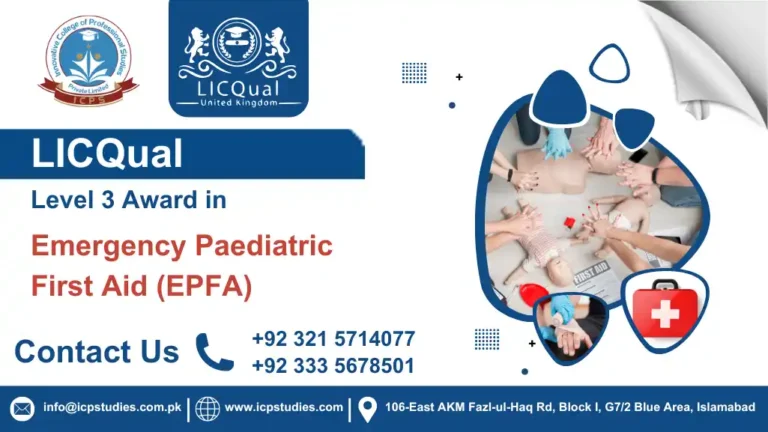In the realm of construction safety and compliance, the role of a Scaffolding Inspector is pivotal. Ensuring the integrity, safety, and compliance of scaffolding structures demands specialized knowledge and skills. The Level 3 Award in Scaffolding Inspector stands as a beacon of expertise, equipping professionals with the proficiency to uphold safety standards and oversee scaffolding operations effectively.
The Level 3 Award in Scaffolding Inspector is an advanced certification program designed to train professionals in the comprehensive inspection and evaluation of scaffolding structures. Participants learn to assess scaffolding for compliance with safety regulations, identify potential hazards, and ensure structural stability to safeguard workers and prevent accidents.
Level 3 Award in Scaffolding Inspector is not just a certification but a testament to expertise and dedication in ensuring scaffolding safety. By equipping professionals with advanced knowledge and skills, this course empowers individuals to play a vital role in safeguarding construction workers and upholding regulatory compliance in scaffolding operations.
All About ICTQual Level 3 Award in Scaffolding Inspector
Course Overview
The Level 3 Award in Scaffolding Inspector is a specialized certification designed to equip individuals with the knowledge and skills necessary to inspect and evaluate scaffolding structures in accordance with safety regulations and industry standards. This certification program is aimed at professionals who play a critical role in ensuring the safety and structural integrity of scaffolding systems used in construction and other industries.
The Level 3 Award in Scaffolding Inspector is essential for professionals dedicated to maintaining high safety standards and regulatory compliance in scaffolding operations. By obtaining this certification, individuals demonstrate their commitment to safety excellence and proficiency in safeguarding workers and ensuring structural integrity on construction sites. This course not only equips participants with specialized knowledge and skills but also prepares them for rewarding career opportunities in construction safety and scaffolding inspection.
Study Units
- Introduction to Scaffolding Inspection
- Types of Scaffolding Systems
- Scaffolding Materials and Construction
- Scaffolding Inspection Techniques
- Risk Assessment and Hazard Identification
- Documentation and Reporting
- Emergency Response and Crisis Management
To enroll in the ICTQual Level 3 Award in Scaffolding Inspector, participants typically need to meet the following requirements:
- Age Requirement: Participants should be at least 18 years old.
- Basic Literacy and Numeracy: A good understanding of English, along with basic literacy and numeracy skills, is essential for completing the course.
- Relevant Experience: Prior experience in scaffolding or construction is beneficial, especially in roles related to scaffold erection or inspection.
- Knowledge of Scaffolding Standards: Familiarity with relevant scaffolding safety regulations and standards is advantageous.
- Course Registration: Participants must register for the course through an accredited training provider.
- Payment: Course fees must be paid as required by the training provider.
- Commitment to Attend: Participants should be prepared to attend the full duration of the course and complete any required assessments to receive certification.
Always check with the specific training provider for any additional or varying requirements.
The ICTQual Level 3 Award in Scaffolding Inspector is designed for:
- Scaffolding Inspectors: Individuals responsible for inspecting scaffolding systems to ensure safety and compliance with regulations.
- Site Supervisors and Managers: Those overseeing construction projects who need to ensure proper scaffolding practices and safety measures.
- Health and Safety Officers: Professionals focused on monitoring safety standards and protocols related to scaffolding.
- Experienced Scaffolders: Scaffolders seeking to advance their careers by gaining specialized knowledge in inspection techniques and safety standards.
- Construction Project Managers: Individuals managing projects that involve scaffolding and needing to ensure compliance with safety regulations.
- Training Instructors: Those who train others in scaffolding practices and safety inspections.
This course equips participants with the knowledge and skills necessary to effectively inspect scaffolding, ensuring safe practices and compliance in construction environments.
Learning Outcome
Introduction to Scaffolding Inspection
- Understand the fundamental principles and importance of scaffolding inspection in construction safety.
- Identify the roles and responsibilities of a scaffolding inspector.
- Recognize the legal and regulatory frameworks governing scaffolding inspections.
2. Types of Scaffolding Systems
- Differentiate between various types of scaffolding systems, such as supported scaffolds, suspended scaffolds, and mobile scaffolds.
- Describe the components, configurations, and applications of each type of scaffolding system.
- Evaluate the suitability of different scaffolding systems for specific construction tasks and environments.
3. Scaffolding Materials and Construction
- Identify common materials used in scaffolding construction, including steel, aluminum, and wood.
- Understand the properties, strengths, and limitations of scaffolding materials.
- Explain the assembly, erection, modification, and dismantling procedures for scaffolding systems.
4. Scaffolding Inspection Techniques
- Apply systematic inspection techniques to assess the condition and safety of scaffolding structures.
- Identify common defects, wear and tear, and structural issues during inspections.
- Interpret inspection findings to prioritize and recommend corrective actions.
5. Risk Assessment and Hazard Identification
- Conduct thorough risk assessments to identify potential hazards associated with scaffolding operations.
- Evaluate risks such as falls, collapses, falling objects, and environmental factors.
- Develop risk control measures and safety protocols to mitigate identified hazards.
6. Documentation and Reporting
- Document scaffolding inspection findings accurately and comprehensively.
- Prepare clear and concise inspection reports that outline identified issues, recommended actions, and compliance status.
- Communicate inspection results effectively to stakeholders and ensure understanding of required follow-up actions.
7. Emergency Response and Crisis Management
- Develop emergency response plans specific to scaffolding incidents, including rescue procedures and evacuation protocols.
- Coordinate with emergency responders and stakeholders to ensure timely and effective responses to scaffolding emergencies.
- Implement crisis management strategies to minimize disruptions and ensure worker safety during emergency situations.
These learning outcomes are designed to equip individuals with the knowledge, skills, and competencies needed to perform effective scaffolding inspections, mitigate risks, and promote safety in construction environments. By mastering these study units, scaffolding inspectors can contribute to safer workplaces and regulatory compliance within the construction industry.
FAQs about ICTQual Level 3 Award in Scaffolding Inspector







